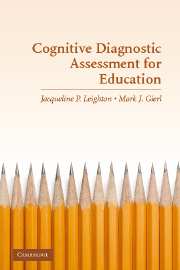Book contents
- Frontmatter
- Contents
- List of Contributors
- PART I THE BASIS OF COGNITIVE DIAGNOSTIC ASSESSMENT
- 1 Why Cognitive Diagnostic Assessment?
- 2 The Demand for Cognitive Diagnostic Assessment
- 3 Cognitive Modeling of Performance on Diagnostic Achievement Tests: A Philosophical Analysis and Justification
- 4 Test Validity in Cognitive Assessment
- PART II PRINCIPLES OF TEST DESIGN AND ANALYSIS
- PART III PSYCHOMETRIC PROCEDURES AND APPLICATIONS
- Author Index
- Subject Index
- References
4 - Test Validity in Cognitive Assessment
Published online by Cambridge University Press: 23 November 2009
- Frontmatter
- Contents
- List of Contributors
- PART I THE BASIS OF COGNITIVE DIAGNOSTIC ASSESSMENT
- 1 Why Cognitive Diagnostic Assessment?
- 2 The Demand for Cognitive Diagnostic Assessment
- 3 Cognitive Modeling of Performance on Diagnostic Achievement Tests: A Philosophical Analysis and Justification
- 4 Test Validity in Cognitive Assessment
- PART II PRINCIPLES OF TEST DESIGN AND ANALYSIS
- PART III PSYCHOMETRIC PROCEDURES AND APPLICATIONS
- Author Index
- Subject Index
- References
Summary
INTRODUCTION
Scientific theories can be viewed as attempts to explain phenomena by showing how they would arise, if certain assumptions concerning the structure of the world were true. Such theories invariably involve a reference to theoretical entities and attributes. Theoretical attributes include such things as electrical charge and distance in physics, inclusive fitness and selective pressure in biology, brain activity and anatomic structure in neuroscience, and intelligence and developmental stages in psychology. These attributes are not subject to direct observation but require an inferential process by which the researcher infers positions of objects on the attribute on the basis of a set of observations.
To make such inferences, one needs to have an idea of how different observations map on to different positions on the attribute (which, after all, is not itself observable). This requires a measurement model. A measurement model explicates how the structure of theoretical attributes relates to the structure of observations. For instance, a measurement model for temperature may stipulate how the level of mercury in a thermometer is systematically related to temperature, or a measurement model for intelligence may specify how IQ scores are related to general intelligence.
The reliance on a process of measurement and the associated measurement model usually involves a degree of uncertainty; the researcher assumes, but cannot know for sure, that a measurement procedure is appropriate in a given situation.
- Type
- Chapter
- Information
- Cognitive Diagnostic Assessment for EducationTheory and Applications, pp. 85 - 116Publisher: Cambridge University PressPrint publication year: 2007
References
- 30
- Cited by

